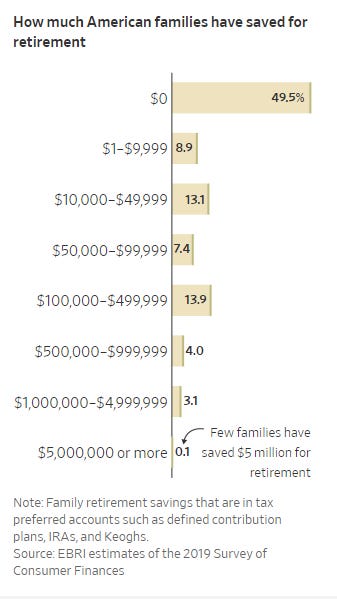It's Not Too Late
We’ve all seen the statistics that show far too many Americans have very little to nothing saved for retirement.
Here’s a graph from a Wall Street Journal article showing how much American families have saved up in their retirement accounts:
Half of all families don’t have a single dollar saved up in a 401(k) or an IRA. And only 20% of households have more than $100,000.
Going beyond just retirement accounts and looking at total savings, here are more graphs from a different Wall Street Journal article outlining average savings by age and the percentage of adults who think they’re on track for retirement:
Keep in mind, that those average savings numbers are also buoyed by a small group of Americans with millions saved up. And while confidence in your ability to retire seems to increase with age, the percentage of people who feel they’re on track for retirement doesn’t reach 50% in any of the age cohorts.
So, what do people do if they reach retirement age without sufficient funds to support their lifestyle?
Well, considering humans are really good at adapting and surviving, it’s typically a combination of a few things:
They continue to work. This option is becoming more and more prevalent. According to a survey by AARP, more than one in four people say they never plan on retiring. This plan may work for some, however, physical ailment and disability become increasingly common as we age and many are forced to stop working earlier than they expected.
They drastically cut back their lifestyle and decrease spending in retirement.
They receive financial help from family.
For those who would prefer not to resort to one of the above measures, the recommended advice is that you start saving and investing your money early and often.
But what if you feel like you’ve missed the “early and often” part of saving?
The title of the Wall Street Journal article I referenced above is, I’m 37 Years Old, and I Haven’t Saved Nearly Enough for Retirement. What Do I Do?
“Like so many people of my generation, I’ve fallen behind in my retirement savings. The combination of entering the workforce during the financial crisis and the burden of student debt has put me and many others behind from the beginning. And the higher cost of living over the past few years has only made saving harder. Once you’re behind a little, it’s easy to keep falling farther and farther behind.”
I hear this sentiment a lot.
Just the other day I was having a conversation with someone who felt discouraged by their financial situation and their final question was, “Is it too late for me?”
No. It’s not too late.
If a 25-year-old invests $500 every single month earning an average annual return of 10%, they’ll end up with around $2,700,000 by the time they’re 65. That’s the benefit of having a 40-year investment horizon.
But let’s say you don’t start investing until you’re 35, how much money would you need to save to get to that same $2,700,000 by age 65?
Starting at 35, you’d need to invest $1,370 per month.
Starting at 45, you’d need to invest $3,950 per month.
Starting at 50, you’d need to invest $7,100 per month.
Does it help to save early and often? Of course. But that doesn’t mean all is lost if you didn’t start stashing away every penny in your twenties. You’ll just have to supercharge your savings and play a bit of catch-up.
Saving more money as you age is very doable and even the norm for most people. The average American reaches their peak earning years between the ages of 45 and 54. And for most, that peak doesn’t see much of a drop off from 55 to 64.
Coincidentally, that stage of life also tends to coincide with fewer expenditures on kids as they leave the house and maybe fewer debt payments as student loans and mortgages are now paid off. It’s a great time to make saving a priority and get back on track with your financial goals.
If you went around and surveyed every adult in the U.S., regardless of age, I’m positive almost everyone would say they wish they would have started saving and investing sooner. So if you’re feeling like it’s too late for you, you’re not alone.
Even if you are at the point where you can’t save up enough to reach your ideal level of wealth, simply getting started and having something— anything—saved is so much better than having nothing.
The best that any of us can do is start now with what we have and see where that takes us.
Thanks for reading!








